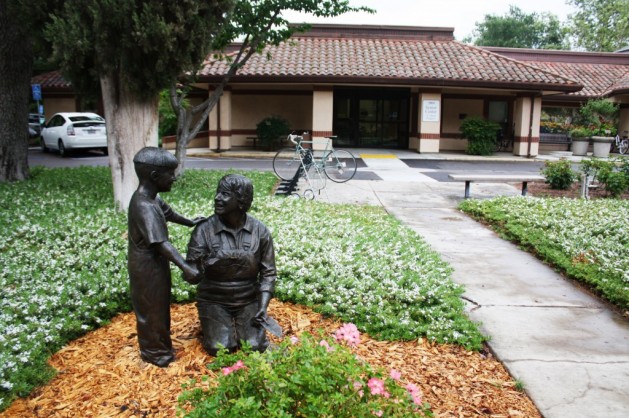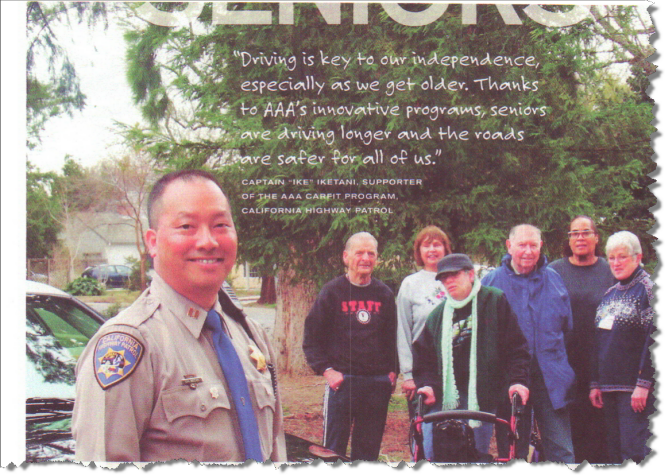Visit to Senior Center Ends in Conversation with a Police Officer
Traumatizing is the word used by longtime Davis resident Jim Leonard and an elderly couple who just…
Traumatizing is the word used by longtime Davis resident Jim Leonard and an elderly couple who just…
by Eric Gelber The Vanguard has recently run a number of articles touting the virtues of the…
As the latest Measure R project moves forward, one of the key questions is whether the community…
Council on Tuesday night will introduce a Universal Access Ordinance that, if adopted, will make all all…
by Matt Williams Yesterday Bob Fung applauded the many years of valuable service by the Davis Chapter…
by Renee Dryfoos It should be no surprise that thousands of people are turning 65 each and…
 By Matt Williams
By Matt Williams Over the past few years we have done a lot of talking about successful aging, and specifically about senior housing. As we continue to wrestle with these aging issues it is useful to see how others are looking at the challenge of successful aging.
In a story published today, PBS looked at the “Top 10 U.S. Cities for Successful Aging.”

About 60 interested seniors were in attendance at the Aug. 28, 2012 scheduled Senior Citizens of Davis (SCD) Board meeting, ready to weigh in on agenda items. They gathered in the previously arranged for MPR East at the Davis Senior Center, which seats well over a hundred people. On the agenda were the following items:
 By E. Roberts Musser
By E. Roberts Musser
In my capacity as an attorney and as a consumer advocate, I was asked by SCD members to review the new proposed bylaws. I gave my honest legal opinion the proposed changes were not in the best interests of SCD, nor its membership. Some concerned SCD members took their complaints to the Davis Senior Citizens Commission. It was there that SCD Board President John Gerlich was encouraged by Commissioners to slow down the process and obtain more member input before putting the matter to a vote.
 By E. Roberts Musser
By E. Roberts Musser
A controversial issue arose during the June 12, 2012 Davis Senior Citizens Commission meeting. Members of the 501(c)(3) non-profit Senior Citizens of Davis (SCD) came to the Commission, to voice their concerns about major proposed changes to the SCD bylaws approved by the SCD Board. In the current bylaws, SCD had as part of its mission, the requirement of mutual cooperation between SCD and the Davis Senior Center. However, the new proposed bylaws completely omit and do not mention the Davis Senior Center whatsoever.
Of particular concern is the clause about winding down the nonprofit corporation. The current bylaws require that upon dissolution, any remaining assets be used for the purposes of enhancing the programs for older adults offered through the Senior Center. Right now, approximately $560,000 is sitting in SCD accounts. Much of it was donated by a single benefactor, who assumed the terms of the current bylaws would continue to be controlling. The proposed bylaws will now allow any 501(c)(3) non-profit to be the beneficiary of an SCD dissolution – including a nonprofit any SCD Board member might decide to set up in the future.
 By E. Roberts Musser
By E. Roberts Musser
A cause for concern, that has come to the forefront of public discussion recently, is the overly frequent administration of psychoactive drugs to nursing home residents. California Advocates for Nursing Home Reform (CANHR) are strong activists against such practices. According to a quote in their brochure Toxic Medicine: What You Should Know To Fight The Misuse Of Psychoactive Drugs In California Nursing Homes, “Tens of thousands of nursing home residents with dementia receive powerful antipsychotic drugs that are not intended or approved for their medical conditions. Rather, the drugs are often used to sedate and control them, a terrible substitute for the individualized care they need and deserve.”
It continues by noting “Antipsychotic drugs don’t just hasten death, they often turn residents into people their own families barely recognize by dulling their memories, sapping their personalities and crushing their spirits. When families win battles to take residents off these drugs, they sometimes find that the person they’ve always known is still there.” This issue was recently discussed at both the Yolo County Commission on Aging & Adult Services, and the Davis Senior Citizens Commission. I would like to share three different experiences various citizens and professionals in the field have related in the commissions or to me as an individual on this very issue.
 By E. Roberts Musser
By E. Roberts Musser
The Davis Senior Citizens Commission convened a forum on hospice issues. There was a selected panel composed of an internest/geriatrician from Vitas Innovative Hospice Care, a social worker from the UC Davis Medical Center, and a representative from Sutter Hospice. Three Commissioners shared their own hospice experiences, and an attorney-commissioner described two of her clients who had less than optimal hospice encounters.
For the uninitiated, hospice care is of two types:
 By Elaine Roberts Musser
By Elaine Roberts Musser
If a driver is physically or mentally impaired to such an extent that it seriously interferes with the ability to drive safely, what should be done? According to California Highway Patrol Chief Mona Prieto, “There are 11 million drivers 75 and older in the United States. With the baby boomer population aging, in twenty years one in four drivers will be elderly. And studies by the Insurance Institute for Highway Safety find that older drivers themselves suffer the most severe consequences of their crashes.”
 By E. Roberts Musser –
By E. Roberts Musser – Asset Protection (for the benefit of the elderly loved one)
 By E. Roberts Musser –
By E. Roberts Musser – Requests for subscription renewal would come in the mail for the husband on a steady basis, to magazines he had already paid for ten times over. Because of his failing memory, he would completely forget he had already paid for the subscription on numerous occasions prior in a matter of a few months. The more frequently he would pay, the more often the subscription renewal forms would come in. Eventually the deluged old fellow was getting one notice a month for each of numerous magazines and newsletters.
 By E. Roberts Musser –
By E. Roberts Musser – Some on the Davis Senior Citizens Commission were approached by a representative of Carlton Senior Living, “a private, family-run company dedicated to creating assisted living communities”. This business is proposing the development of a 125 unit assisted living facility on the end of town where the Davis Post Office is located. It would be a small infill project called Carlton Plaza Davis, with 25 of the units situated in a dementia wing.
 By E.A. Roberts –
By E.A. Roberts –
 By E. Roberts Musser –
By E. Roberts Musser – The current political mantra at both the federal level and here in the state of California is the perceived need for “universal health care”. It is seen as the solution to the crucial issue of health care reform. Rather the more important question should be: “Is universal health care the answer to rising health care costs and the ever increasing number of uninsured, or are there other options to consider that might be better?”
 Word To The Wise
Word To The Wise
A Bombshell Was Dropped – What’s Next?
By E. Roberts Musser
In our Davis Senior Citizens Commission meeting on Thursday, March 12, 2009, our City Council liaison Sue Greenwald dropped a bombshell. At least it felt that way to some of us on our commission. Councilmember Greenwald said there was a “cost saving” move afoot to consolidate the city’s commissions – yet again. The rationale behind this move is supposedly to cut down on city staff expense.
 City of Davis
City of DavisWake Up and Smell the Coffee!–PART 2
By E.A. Roberts
Part 1 was published Thursday February 19, 2009
Where Do We Go From Here?
1. Stop encouraging the policy of lending money to folks who do not have the wherewithal to repay.